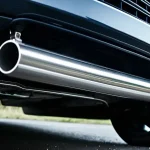Essential UK Noise Laws for Enhanced Vehicle Exhausts
Understanding regulations boosts compliance and enjoyment
The UK vehicle noise laws establish strict controls on exhaust noise, aiming to balance performance enhancements with community peace. All vehicles must adhere to legal noise limits specified by the government, which set maximum allowable decibel levels for both cars and motorcycles.
Also to read : Convert your van into a legit uk camper: your ultimate step-by-step guide to an exciting journey
For example, cars typically must not exceed 74 decibels at a designated testing distance, while motorcycles have separate, often stricter limits. These noise thresholds are measured under standard conditions, ensuring consistency in enforcement.
Exhaust system regulations require that any exhaust modifications installed must not increase the vehicle’s noise beyond these legal limits. This includes aftermarket exhausts, which despite their appeal for improved performance or sound, risk legal penalties if too loud.
Also to discover : Ultimate guide to effortless custom motorcycle registration in the uk: vital steps to follow!
It’s important to distinguish between rules applying to new and existing vehicles: newer models may face additional restrictions as part of updated emissions and noise control standards. Conversely, older vehicles might have grandfathered provisions but still must meet basic noise compliance.
Understanding these UK vehicle noise laws helps avoid fines and preserves road safety, making it essential for anyone considering exhaust changes to review regulations carefully before installation.
Compliance Tips for Car Enthusiasts Modifying Exhaust Systems
When modifying your exhaust system, vehicle modification compliance is crucial to avoid costly fines or failed MOTs. Start by ensuring any exhaust changes meet DVSA and MOT requirements. These authorities mandate noise limits and emissions standards to keep roads safe and environmentally friendly.
Use certified components when upgrading your exhaust. Products with proper certification not only ensure performance but also demonstrate compliance with legal exhaust upgrades. Avoid cheap, uncertified parts as they can lead to problems during inspections. Additionally, have your exhaust modifications installed by reputable installers who understand current compliance standards.
Before finalizing your upgrade, verify your modifications with local authorities or professional testers. This step confirms that your exhaust system remains street legal and aligns with specific regional rules. Testing provides peace of mind and helps prevent unexpected roadside penalties.
By following these exhaust system tips, you can enjoy enhanced performance while staying comfortably within the law. Clear knowledge about compliance requirements protects your investment and keeps your vehicle on the road without interruptions.
Penalties and Enforcement for Breaching Noise Regulations
Roadside law enforcement checks often include decibel testing to measure a vehicle’s exhaust noise level. Officers use handheld meters during these stops, ensuring vehicles comply with legal limits. If the noise exceeds allowable levels, drivers face penalties for loud exhaust, which can vary depending on the jurisdiction but commonly include fines and fixed penalty notices.
Failing to meet noise regulations can result in an MOT failure, requiring owners to rectify the issue before the vehicle is deemed roadworthy. In many cases, this means repairing or replacing the exhaust system to reduce noise output to legal levels. Accumulating points on a driving licence is also a possibility if the offence is severe or repeated.
To return to compliance, vehicle owners should promptly address any faults identified during roadside checks or MOTs. This proactive approach prevents further penalties and ensures ongoing adherence to noise regulations. Understanding the scope of enforcement, from fixed penalty notices to MOT failure, helps motorists navigate legal responsibilities effectively and maintain a quieter, safer road environment.
Recent Updates and Official Resources for Staying Informed
Keeping up with the latest UK noise law changes is crucial for compliance and avoiding penalties. Recent updates focus on stricter regulations for vehicle noise, targeting excessive exhaust noise and modifications that breach legal limits. These changes aim to reduce noise pollution and improve road safety.
The Driver and Vehicle Standards Agency (DVSA) offers a wealth of official resources to help drivers understand and adhere to these laws. Their guidance provides detailed explanations of permissible noise levels and procedures for roadside noise testing. Accessing DVSA publications regularly ensures you stay informed about enforcement priorities and any amendments.
To stay updated, consult government websites featuring dedicated sections on noise regulations and vehicle standards. Professional advice is also available through legal experts specializing in transport law, who can interpret nuances and offer tailored solutions.
Relying on these official resources and expert insights empowers vehicle owners to remain compliant with the evolving noise legislation. Remember, staying informed is your best defence against potential infractions related to noise limits and vehicle compliance.
Balancing Performance and Legality in Exhaust Enhancements
Finding the right balance between performance exhaust legal compliance and maximizing power is essential when upgrading your vehicle. In the UK, car tuning laws set clear limits, especially regarding noise emissions from aftermarket parts. To stay on the right side of the law, always choose aftermarket parts UK suppliers who provide components tested to meet legal sound thresholds.
Many enthusiasts worry that legal exhausts won’t deliver the desired performance boost. However, real-world case studies show that legal modifications can enhance engine output while maintaining sound levels within permitted limits. For example, using high-quality catalytic converters combined with tuned mufflers helps optimize airflow without exceeding noise restrictions.
Practical advice includes regular maintenance, such as checking for leaks or corrosion in the exhaust system. Unintentional legal breaches often occur when damaged parts increase noise levels beyond legal thresholds. Ensuring all fittings are secure and components intact preserves both vehicle performance and compliance.
By selecting tested performance exhaust legal systems and applying diligent maintenance, drivers can enjoy improved tuning results without risking fines or vehicle inspections. Balancing these factors supports a rewarding, lawful car tuning experience.



